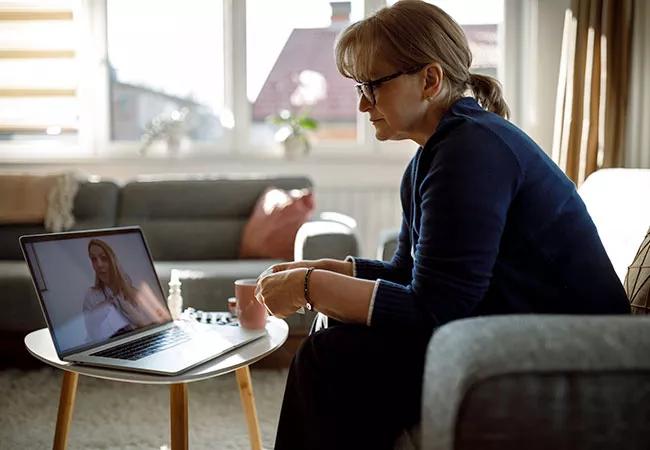NIH grant supports longitudinal study of clinical, cost and patient/clinician experience outcomes

Image content: This image is available to view online.
View image online (https://assets.clevelandclinic.org/transform/ee795395-a9d5-4908-9ac7-55655c81f566/22-NEU-3294094-CQD-Hero-650x450-1_jpg)
22-NEU-3294094-CQD-Hero-650×450
Nearly 1 million people in the United States have been diagnosed with multiple sclerosis (MS), which is associated with an estimated U.S. economic burden of more than $85 billion in direct and indirect costs. Telehealth has the potential to reduce those costs and improve access to care for people with MS, but its utility and value for long-term, comprehensive management in this setting remain largely unstudied.
Advertisement
Cleveland Clinic is a non-profit academic medical center. Advertising on our site helps support our mission. We do not endorse non-Cleveland Clinic products or services. Policy
Building on pioneering efforts in the use of in-home, video-based telehealth visits for patients with MS, clinicians at Cleveland Clinic and the University of California San Francisco (UCSF) aim to fill that research gap with the launch of a randomized clinical trial. The study, which is supported by a $2.8 million National Institutes of Health grant, will be the first such trial to directly assess the effects of longitudinally conducted telehealth visits on MS outcomes and cost of care.
The MS centers at Cleveland Clinic and UCSF each see about 250 MS patients per week. The institutions already have made a number of contributions to the literature regarding cross-sectional telehealth care in MS — namely, demonstrating its feasibility, acceptability, and reduced direct and opportunity costs to patients.
However, studies to date on telehealth care in MS have been limited by a short timeframe (three to six months), a narrow research scope (e.g., specific symptoms) and underpowering for evaluation of robust clinical outcomes. The longitudinal nature of the new trial will allow evaluation of standard clinical outcomes, care quality outcomes and patient-reported outcomes.
The study will compare disease-related outcomes in patients with MS randomized to management via either telehealth or routine in-clinic care over a two-year period. Major healthcare costs in the two management arms also will be compared, and both patient and clinician experience will be assessed to identify facilitators of, and barriers to, implementation of telehealth in this setting.
Advertisement
“We hope to show we can provide the same level of care with telehealth as with in-office visits, from a clinical outcomes perspective,” says principal investigator Marisa McGinley, DO, a staff neurologist in Cleveland Clinic’s Mellen Center for Multiple Sclerosis Treatment and Research. “We also hypothesize that telehealth will be less expensive for the healthcare system and associated with higher levels of satisfaction for patients and clinicians.”
The two-site trial (Cleveland Clinic and UCSF) will enroll 120 participants diagnosed with MS within the prior 12 months. After an initial in-person visit, they will be randomized 1:1 to receive follow-up MS care via telehealth or standard in-person visits with their MS clinician. The study is focused on newly diagnosed patients to avoid participants having preconceived notions about what delivery of their MS care would be like, Dr. McGinley notes.
“A lot of patients in our MS practice come from quite a distance, and that can be a hardship, as has particularly been the case with COVID-19,” she adds. “We began planning for this grant before the pandemic as a way to expand patients’ access to care using telehealth.”
To assess the two delivery methods’ clinical effects, the investigators will compare standard clinical outcomes (e.g., disability worsening, MS relapses, MRI activity) and patient-reported outcomes (quality-of-life measures, treatment plan adherence) between the two management arms.
Cost implications of the delivery methods will be evaluated by calculating direct and indirect medical and nonmedical costs from the perspectives of patients, payers and society and by performing cost-effectiveness analyses.
Advertisement
The experience of telehealth care for patients and clinicians will be assessed with validated surveys using the Health IT Usability Evaluation Model. Trial participants will be asked about the usefulness of the technology and its ease of use and likeability. Exit interviews also will be conducted with purposefully sampled trial participants and clinicians.
“Neurologists are the backbone of care for people with MS, so we are interested to learn whether replacing in-person interaction with telehealth interaction impacts that relationship in important ways,” says Dr. McGinley. “We’ll also be looking at providing comprehensive MS care at a distance, which hasn’t been done consistently. What does it take, for example, to meet the need for physical or occupational therapy in the home or local community, and will patients find it more convenient?”
The researchers will supplement the study’s primary clinical outcomes with exploratory digital health outcomes through the use of wearable activity monitors. These outcomes have the potential to be more objective and more sensitive to early changes in function, and they may help enhance patient self-management.
Additionally, the investigators plan to do exit interviews to obtain viewpoints from populations that have been identified as understudied in MS or who have already-identified barriers to telehealth use. Findings from these interviews will inform efforts to ensure equitable implementation of telehealth models for all people with MS.
Advertisement
Advertisement
Outpatient referral order connects care teams before patients’ ED arrival
Automating routine medical coding tasks removes unnecessary barriers
Digital “tripwires” detect and respond to malicious activity, boosting cybersecurity maturity
Effective provider training strategies incorporate multi-modal delivery
Thoughtful collaboration, data-driven decisions and effective change management lead to significant savings
A thoughtfully designed program to elevate participants’ leadership potential
Clinical input is integral to technology implementation and adoption strategy
Advancing technology makes informatics expertise essential